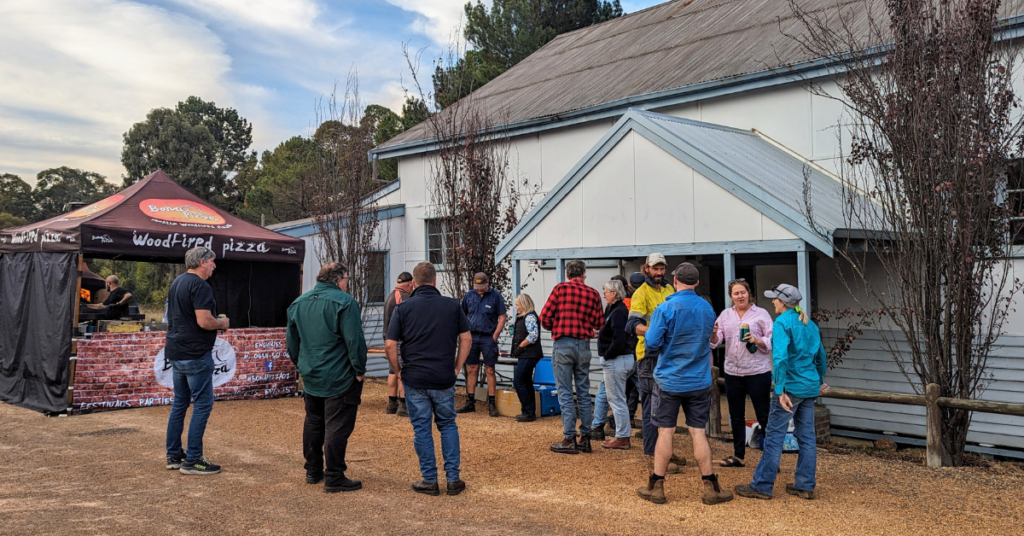
South West NRM has been supporting Western Beef Association’s series of Recovery Chat events, delivered in response to the current dry season challenges.
Guest speakers including a vet, agronomist and financial counsellor have been providing some valuable, very practical advice so for those who have been unable to attend, or those who need a reminder of topics discussed, we’ve created the following summary.
First up, cattle veterinarian Ian Bradshaw said it had been one of the most difficult seasons he’d seen in his 20 years of practice.
And while many had received their first autumn rain, Ian said it was too early to say that we had reached drought recovery just yet.
The Challenges
From a vet’s perspective, Ian said one of the biggest challenges he was seeing out in the paddocks among herds was vitamin F (food) deficiency.
On average, due to current conditions, a lactating Angus Cow was losing 250g a day more than usual while calves were gaining 500g less a day than needed for healthy growth.
“Weight loss in cows at this time of year is not linear…once its fat resources are depleted, it’s at risk of falling off a cliff in terms of weight loss,” he said.
Reduced feeding would lead to ongoing challenges into spring and beyond if not carefully managed now especially:
- Decreased fertility due to excessive weight loss;
- Calf stress;
- Increased risk of Grass Tetany (low blood magnesium due to underfeeding);
- Worms and lice.
Ian predicted that average seasonal fertility rates of around 87%, would for the first time drop below 80%.
Nutrition deficits would affect not only the quality of the cow’s egg but also its hormone levels as well.
Ian’s advice
- Prioritise resources;
- Defer grazing;
- Evaluate most optimal time for calving and consider joining the bulls with the cows for longer;
- Don’t breed culls;
- Hormone treatment;
- Herd reduction;
- Cull ruthlessly – “There’s no room for passengers”.
- Pregnancy test early and boost condition of cows through weaning time;
- Focus on hay/silage production;
- Do a feed budget for next year and if needed, buy early on quality (Ian said this could save thousands. Fine tune your feed budget using Rumen8 software);
- Confirm diagnosis in sudden deaths.
Advice from agronomist Graham Mussell
Strategy | Expected production bump (kg per ha) |
Add fast-growing species to pasture seed. | 500 |
Defer grazing | 750 |
5cm grazing residual | 750 |
Apply gibberellic acid with nitrogen | 500 |
Control bugs | 600 |
Graham cited various trials, including South West NRM’s Pasture Challenge had demonstrated increased early feed available through adding fast-growing species like barley or oats into the seed mix.
On deferred grazing, he suggested strategically picking which paddocks to defer, particularly those with good pasture composition.
He said a trial by Western Dairy in 2018 had demonstrated a 400kg per hectare increase in pasture production by managing residuals to 5cm. “You’ll suffer an ongoing penalty for grazing at 3cm,” he said.
Graham said he believed strategic use of nitrogen had a place in the current challenging conditions but to avoid applying before rain as losses would be too great.
On pests, Graham said to keep a close eye on any change in the plants and once detected, find out what it was and apply appropriate controls.
A note on wellbeing
Both Rural West’s Dean Bavich and Glen Dunkerton from Regional Men’s Health Initiative provided tactics for managing stress and overwhelm.
Dean said he was seeing a lot of exhausted farmers experiencing situational distress which could often lead to behaviours like ignoring the problem, procrastinating and/or impulsive decision-making.
But he encouraged farmers to reach out to Rural West who could help with revealing solutions and developing a plan for moving forward.
His suggested action steps included:
- Plan, monitor, adjust;
- Prepare and be proactive;
- Evaluation options;
- Have a clear direction;
- Know your finance situation;
- Be flexible and adjustable.
Glen said uncertainty had the biggest impact on mental health and it was important for men to ‘check their shock absorbers’.
His advice included:
- Identify your peers, partners, mentors and mates;
- Develop healthy habits;
- Take time out;
- Talk about things;
- Reduce alcohol consumption;
- Take a holiday when possible;
- Maintain social connections.
For more resources to assist with navigating challenges of the dry season, visit our new interactive platform, The Livestock Feed.
